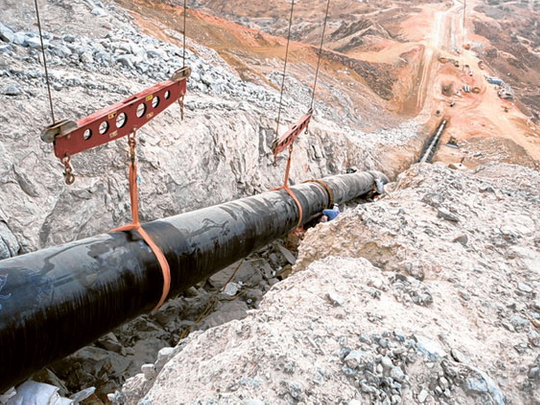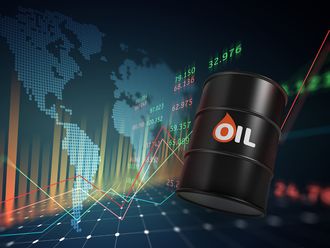
For a long time now, Fujairah has been considered a highly potential oil port. Its strategic location outside the Arabian Gulf coupled with its proximity to the oilfields of the UAE and the already existing oil installations must have contributed to this view.
But the delays in implementing some projects have reduced the role of Fujairah to a storage depot of crude oil and petroleum products in addition to a modest refinery of 70,000 barrels a day.
Yet Fujairah today is the second largest bunkering port in the world after Singapore.
There is more to come shortly. The 400-kilometre oil pipeline from Abu Dhabi fields, where construction started in 2008, will be operational soon as tests are underway.
The pipeline will eventually deliver 1.8 million barrels a day of crude to export markets and make Fujairah port a strategic storage facility having additional tanks of 12 million barrels at the pipeline terminal.
The project will save tankers plying the region one extra day on entry and leaving the Arabian Gulf as is the case now. It will also reduce insurance rates by avoiding the tension-prone Hormuz Strait where about 18 million barrels a day of crude oil passes the Strait to international markets.
The pipeline is owned by the International Petroleum Investment Company, which is an investment arm of the government of Abu Dhabi. About 70 per cent of the UAE's oil production is expected to be exported thorough this pipeline.
Encouraged by the completion of the pipeline, IPIC announced recently that it is going ahead with the implementation of a 200,000 barrel a day refinery near the pipeline terminal in Fujairah, at an estimated cost of $3 billion.
The project is currently in its preparation stages of studies and engineering and selection of prospective project management and completion is anticipated by 2016. The refinery will process UAE crudes delivered by the pipeline and will use the deep water ports there for the export of its products.
The refinery has been talked about since 2006 but withdrawal of partners has forced the delay and made IPIC scale down the project from 500,000 to 200,000 barrels a day, a wise decision given the excess refinery capacity currently prevailing.
But the room for future doubling of capacity is surely there given the rising demand for products in Asian markets.
Although Fujairah is an important bunkering port, the refinery must be able to furnish enough fuel oil and at the same time be complex enough to generate more light products demanded by the market.
It must also be aware that fuel oil specification is heading towards a low sulphur level and this can only be achieved through complex refining.
The new project should, as much as possible, try to integrate the existing refinery and improve the quality of its products.
With the expansion of the Ruwais refinery, the new project will increase substantially the product export capability of the UAE to soaring Asian markets, especially as other refining projects are delayed.
The project is expected to create more than 750 permanent jobs and it might be a good idea to start training people from now to take up most of these jobs by UAE nationals. Ruwais and its institutes are the right place for this function.
It is not clear whether IPIC will seek partnership in the refinery project, but it will surely have plenty of interest from Asian companies who will be attracted by their own products demand and a guaranteed supply of crude oil via the pipeline.
Storage facilities, a well established and successful function in Fujairah, are also expected to expand significantly where 136 tanks having a capacity of three million cubic metres will be completed by the end of 2012 and later expanded to 262 tanks and seven million cubic metres.
This is in addition to many more tanks in existing terminals and the refinery. All these activities have prompted the emirate government to establish the Fujairah Zone for Petroleum Industry, which will be responsible for the emirate's petroleum affairs and administrative services to investors.
It is hoped that the authorities will be aware of the logistical requirements for these activities whether during construction and later during operation. Therefore it is important to expand the housing and social services at an early stage and in line with the ongoing progress.
The writer is the former head of Energy Studies Department in Opec Secretariat in Vienna.












